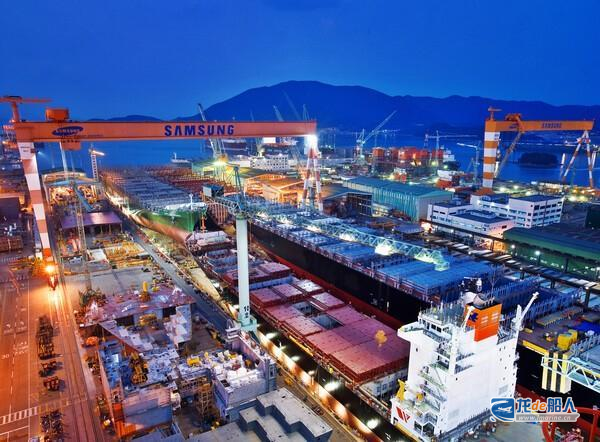South Korean media reported that Samsung Heavy Industries is the only major South Korean company to have violated its obligation to report workplace accidents more than twice within three years. Some believe this could spark controversy over the “accident cover-up” at shipbuilding sites, leading to growing calls for comprehensive improvements to safety management systems.

According to recent data released by Ministry of Employment and Labor (MOEL) of South Korea, a total of 18 companies violated their obligation to report workplace accidents twice or more between 2021 and 2023. Among them was Samsung Heavy Industries’ Geoje Shipyard, which was found to have underreported two accidents.
As the 2024 workplace injury data released by the MOEL includes cases under investigation or pending conviction, the statistical period covers 2021 to 2023. Data for 2024 will be finalized by the end of 2025. With the release of these figures, cracks have appeared in the credibility of Samsung Heavy Industries’ longstanding claim of “zero major accidents.”
Samsung Heavy Industries’ violation ultimately resulted in a fine. Under Article 57 of South Korea’s current Industrial Safety and Health Act, employers must report to the Ministry of Employment and Labor whenever a worker dies or sustains an injury requiring more than three days of medical leave. Violators face fines of up to 15 million won.
Samsung Heavy Industries’ Inconsistent Actions and Recurring Accidents
According to Samsung Heavy Industries’ annual sustainability reports, the company states that it consistently aims to achieve “zero major accidents” and emphasizes safety as its top priority. Specific measures include reducing the Lost Time Injury (LTI) rate, fostering a voluntary safety culture, and implementing an intelligent HSE (Health, Safety, and Environment) management system.
However, the reality is quite the opposite. Accidents continue to occur frequently at Samsung Heavy Industries’ shipbuilding sites. This year alone, Samsung Heavy Industries has seen two major accidents: one subcontractor worker had his arm severed by flying debris, and another subcontractor died after being crushed while repairing a monorail on a ship under construction. These consecutive accidents have prompted an emergency inspection by the MOEL, raising concerns within South Korea’s industry about the lack of safety awareness at the site.
South Korea’s industry believes that as companies touting “zero accidents” become embroiled in scandals over improper reporting, the disconnect between regulations and reality has been laid bare. A source revealed: “While the company maintains that reporting is safer in principle, field operations may neglect compliance due to perceived inconvenience. Employees sometimes face unfair treatment solely for reporting incidents, fostering hesitation. Despite shipbuilders’ increased safety investments and management efforts, accidents persist—suggesting new approaches like external perspectives may be needed to resolve the issue.”
Regarding Samsung Heavy Industries’ underreporting of accidents, the South Korean shipbuilding industry believes the company urgently needs to move beyond formalistic reporting practices and demonstrate a genuine commitment to safety. At its core, this stems from a pervasive mindset within and outside the industry—a reluctance to both experience and disclose accidents. This mindset originates from a culture that treats “zero accidents” as a performance metric, inevitably creating an incentive for “concealing incidents” at the operational level.
South Korean scholars state: “Many enterprises underestimate ESG and misuse its concept. If ESG management were genuinely implemented, these aspects (accident reporting) should have been comprehensively controlled. While companies can attract external investment through ESG ratings, rather than merely focusing on superficial indicator management, they should conduct a substantive review of its core meaning.”
Senior management’s lack of security awareness has drawn close scrutiny from financial institutions
According to reports, the unreported accidents and violations of the Major Accidents Act investigation notified by the MOEL all occurred during the tenure of Samsung Heavy Industries Vice Chairman Choi Sung-an (transliterated). Choi Sung-an was promoted from president to vice chairman in 2022 and also appointed as a representative director of Samsung Heavy Industries. This marks the first time in 12 years—since the resignation of former representative director and vice chairman Kim Chang-wan (transliterated) in 2010—that Samsung Heavy Industries has appointed a vice chairman-level executive to serve as a representative director.
Recently, South Korea’s financial regulators have taken action. For heavily indebted “principal debtor groups” undergoing financial soundness assessments by creditor banks, regulators are considering actively incorporating potential risk factors such as major disaster occurrence risks into their financial structure evaluations.
Regarding the underreporting incident, a Samsung Heavy Industries representative stated: “The omission resulted from operational oversight during business processing. The company has paid the required fines and implemented systemic improvements to prevent future failures in submitting workplace accident investigation forms.”


